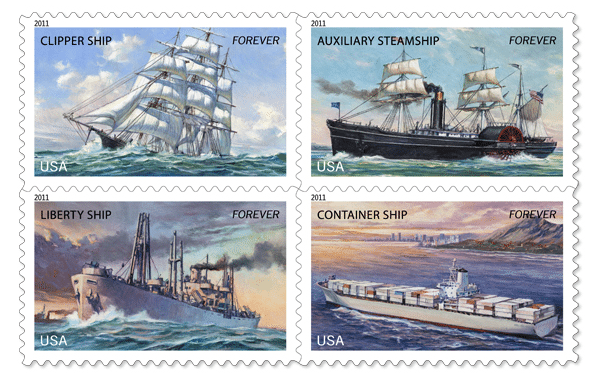Was The World’s ‘Northern-Most Island’ Erased From Charts?
by Kevin Hamilton (University of Hawaii) In 2021, an expedition off the icy northern Greenland coast spotted what appeared to be a previously uncharted island. It was small and gravelly,...


Last week, the United States Postal Service issued 60 million Forever stamps commemorating the history of the U.S. Merchant Marine. The stamps, illustrated by Dennis Lyall under the art direction of Carl Herrman, feature four vessels that played an integral role in America’s maritime history — clipper ships, auxiliary steamships, Liberty ships and container ships.
With the issuance of the stamps, USPS reminds us that it’s not just about the ships, but the men and women of the U.S. Merchant Marine that deserve recognition. “As we dedicate these stamps, we pay homage not only to the ships, but also to the valor of the thousands of dedicated members of the U.S. Merchant Marine who served their country and served it honorably,” said USPS’ Vice President of Product Information, Jim Cochrane.
Now here is a look at each stamps illustration and little bit about why it was chosen.
The Clipper Ship stamp (top left) is based on an undated lithograph (by Frank Vining Smith) of the famous clipper Sovereign of the Seas, which launched in 1852. Clipper ships, ushered in by the California Gold Rush of 1849 and noted for their streamlined shape and majestic cloud of square-rigged sails, set numerous speed records for their time.
The Auxiliary Steamship stamp (top right) is based on contemporary lithographs of ships of the Collins Line, which provided service between New York and Liverpool in the 1850s. Auxiliary steamships—steam-powered ships with back-up sailing rigs—were the ocean liners of their day, competing in the 1850s with clipper and other sailing ships for transatlantic mail and passenger service.
The Liberty Ship stamp (bottom left) is based on a photograph of an unidentified Liberty ship in the files of the Westport Public Library in Connecticut. During World War II, the United States built more than 2,700 Liberty ships, plain but sturdy cargo vessels that sustained the Allied forces with a steady supply of food and war material.
The Container Ship stamp (bottom right) is based on an undated photograph of the R.J. Pfeiffer, a modern container ship launched in 1992 and operated by Matson Navigation Company. Container ships, pioneered in the 1950s, are the lifeblood of today’s global economy, carrying nearly all the world’s manufactured goods across the oceans and exemplifying the modern merchant marine.
Interested in picking us your U.S. Merchant Marine stamps? Click HERE to start shopping at USPS.com
Via USPS
Join the gCaptain Club for curated content, insider opinions, and vibrant community discussions.


Join the 105,965 members that receive our newsletter.
Have a news tip? Let us know.
Access exclusive insights, engage in vibrant discussions, and gain perspectives from our CEO.
Sign Up




Maritime and offshore news trusted by our 105,965 members delivered daily straight to your inbox.



Essential news coupled with the finest maritime content sourced from across the globe.
Sign Up